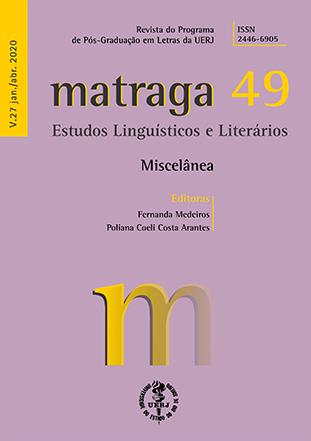Hermann Paul: a precursor of Cognitive Semantics from the perspective of the language in use
DOI:
https://doi.org/10.12957/matraga.2020.48112Keywords:
Cognitive semantics, neogrammarian, semantic change, metaphor, metonymyAbstract
It is already broadly known that many assumptions in the field of cognitive semantics have philosophical, anthropological, as well as linguistic anticipations. The following article confines its attention to the universal linguist Hermann Paul whose merit in the field of historical linguistics is widely recognized. However, his approach is equally usage-based and radically cognitive, which has been largely neglected thus far. For Hermann Paul, who participated in the Neogrammarian Movement, metonymy represents a process that is corporally entrenched and metaphor is conceived as the primary force of semantic change. A profound study of his primary work, Principles of the History of Language (1886) reveals that Paul already starts by the assumption that metaphor is not an exception of poetic creativity anticipating the concept of embodiment, the idea of mapping between two cognitive domains and that of metaphors as cognitive models for the explanation, understanding and exploration of our cultural world. Additionally, he had already contended that the description of metaphors is partial and subjective. As we will see, this key work by Paul, representing an important milestone in the history of linguistics, becomes a unique treasure of indefinite linguistic examples that illustrate the figurative richness and the constant vividness of our language.
Downloads
Downloads
Published
How to Cite
Issue
Section
License
Authorization
Matraga – Scientific Journal of the Post-graduate Program in Arts and Humanities of UERJ is authorized to publish the article submitted here, if it is accepted for online publication. It is attested that the contribution is original, that it is not being submitted to another publisher for publication, and that this statement is the expression of truth.
The works published in Matraga's virtual space – Scientific Journal of the Post-graduate Program in Arts and Humanities of UERJ will be automatically transferred, and your copyright is reserved to Matraga. Its reproduction, in whole or in part, is conditional on the citation of the authors and the data of the publication.

Matraga uses license Creative Commons - Attribution-Non-Commercial 4.0 International.





